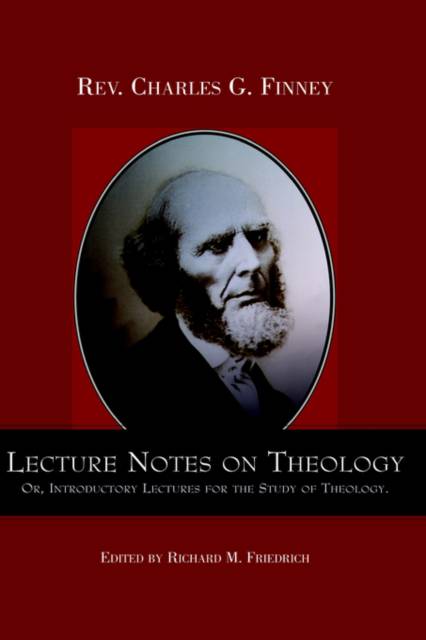
- Retrait gratuit dans votre magasin Club
- 7.000.000 titres dans notre catalogue
- Payer en toute sécurité
- Toujours un magasin près de chez vous
- Retrait gratuit dans votre magasin Club
- 7.000.0000 titres dans notre catalogue
- Payer en toute sécurité
- Toujours un magasin près de chez vous
Lecture Notes on Theology; Or, Introductory Lectures for the Study of Theology.
Charles Finney
Livre relié | Anglais
36,45 €
+ 72 points
Description
The contents of this convicting book are from Finney's unpublished lecture notes. Topics include personal qualifications for the study of theology, advantages gained from this study, things to be avoided, primary and secondary departments of the mind, immortality, rules of evidence, proofs for the existence of God, natural and moral attributes of God. In teaching theology, it is no part of my design merely to lecture to you, and help you to truth without your own efforts. This would do you little good, nay, it might greatly injure you. I would merely help you to study, help you when you endeavor to help yourselves; suggest to stimulate and guide your efforts rather than dispense with them. . . . Take care that you keep your hearts with all diligence, and that your hearts keep pace with your intellectual improvement. If you do not make a self-application of the truth as fast as you learn it, if you do not obey it, it will ultimately blind instead of enlighten you. You must live up to your convictions, or the study of theology will greatly and fatally harden you. Therefore be careful that you grieve not, resist not, quench not the Holy Spirit. Study on your knees. Go to God with every position that is established, and pray him to write the truth in your heart; and rest not till it be adopted by you as your own, as a truth to influence you, to have dominion over you; and as these truths are developed in your intellect one after the other, and established, let it be settled that in the midst of them, and in conformity with them, you are to live and move and have your being. If you do this the study of theology will make you a mellow, anointed, devoted, useful man of God; if you do it not, you will become hardened and reprobate. And of all the reprobate minds in existence, they seem to be the most hardened who have studied theology and gone through the course of theology without receiving the truth into their hearts. CHARLES G. FINNEY (1792-1875) was America's foremost evangelist. Over half a million people were soundly converted under his personal ministry in a day when there was no TV or microphones. He was also an excellent theologian, philosopher, educator, pastor and reformer while professor of theology and president of Oberlin College. Harvard's Perry Miller said, "Finney led America out of the eighteenth century." He is remembered, according to Harvard's W. G. McLoughlin, for his "textbook on how to promote revivals of religion. This book is the perennial classic to which all succeeding generations of revivalists have turned for authority and inspiration." He was also a father to the evangelical and holiness movements.
Spécifications
Parties prenantes
- Auteur(s) :
- Editeur:
Contenu
- Nombre de pages :
- 172
- Langue:
- Anglais
Caractéristiques
- EAN:
- 9781932370102
- Date de parution :
- 03-05-05
- Format:
- Livre relié
- Format numérique:
- Genaaid
- Dimensions :
- 152 mm x 229 mm
- Poids :
- 426 g

Les avis
Nous publions uniquement les avis qui respectent les conditions requises. Consultez nos conditions pour les avis.






